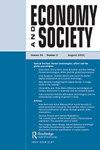作为技术经济治理模式的资产化:联合国国民核算体系中的知识、教育和个人数据
IF 4.3
2区 社会学
Q1 ECONOMICS
引用次数: 0
摘要
资产是通过技术科学和政治经济(或技术经济)关系、主张和实践的配置而产生的;这个过程越来越被概念化为“资产化”。联合国的国民经济核算体系(SNA)——一套国家会计准则——将资产定义为“必须由某个或多个单位拥有的实体,其所有者通过在一段时间内持有或使用这些实体而从中获得经济利益”。SNA等会计准则通过其“资产边界的延伸”涉及资产的构建,随着会计准则的修订和更新以更好地反映不断变化的商业实践,这种情况会定期发生。因此,资产化需要的不仅仅是对某物转化为资产的分析,它还可以被概念化为一种治理模式,在这种模式中,社会行动者改变了他们的世界。为了提出这一论点,我研究了SNA对知识、教育和个人数据的处理:分别被重新定义为资产(例如知识产权产品);被视为准资产(如人力资本);并受到持续辩论的影响(例如,数字数据)。在探讨SNA的会计准则时,我展示了资产化如何以有问题的方式重新配置知识、教育和个人数据的治理。本文章由计算机程序翻译,如有差异,请以英文原文为准。
Assetization as a mode of techno-economic governance: Knowledge, education and personal data in the UN's System of National Accounts
Assets are made through the configuration of technoscientific and political-economic (or techno-economic) relations, claims and practices; a process increasingly conceptualized as ‘assetization’. The UN’s System of National Accounts (SNA) – a set of national accounting standards – defines assets as ‘entities that must be owned by some unit, or units, and from which economic benefits are derived by their owner(s) by holding or using them over a period of time’. Accounting standards like the SNA are implicated in the construction of assets through their ‘extension of the asset boundary’, which happens periodically as accounting standards are revised and updated to better reflect changing business practices. Assetization, then, entails more than an analysis of the transformation of something into an asset, it can also be conceptualized as a mode of governance in which social actors change their world. To make this argument, I examine the SNA’s treatment of knowledge, education and personal data: respectively, redefined as an asset (e.g. intellectual property product); treated as a quasi-asset (e.g. human capital); and subject to continued debate (e.g. digital data). In exploring the SNA’s accounting standards, I show how assetization reconfigures the governance of knowledge, education and personal data, often in problematic ways.
求助全文
通过发布文献求助,成功后即可免费获取论文全文。
去求助
来源期刊

Economy and Society
Multiple-
CiteScore
6.30
自引率
5.90%
发文量
23
期刊介绍:
This radical interdisciplinary journal of theory and politics continues to be one of the most exciting and influential resources for scholars in the social sciences worldwide. As one of the field"s leading scholarly refereed journals, Economy and Society plays a key role in promoting new debates and currents of social thought. For 37 years, the journal has explored the social sciences in the broadest interdisciplinary sense, in innovative articles from some of the world"s leading sociologists and anthropologists, political scientists, legal theorists, philosophers, economists and other renowned scholars.
 求助内容:
求助内容: 应助结果提醒方式:
应助结果提醒方式:


